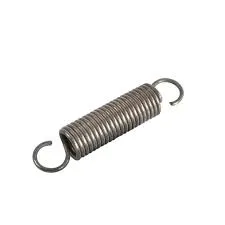
- Mobile Phone
- +8613931874955
- sales@cntcmetal.com
custom wire springs
Custom Wire Springs Precision Engineering for Diverse Applications
Custom wire springs play a pivotal role in various industries, providing essential mechanical functions that are crucial for the performance of numerous products. From automotive to aerospace, electronics to medical devices, these springs are designed to meet specific requirements, ensuring durability, reliability, and efficiency. Understanding the intricacies of custom wire springs is fundamental for manufacturers and engineers alike.
At its core, a wire spring is a component typically made from coiled wire, which can be fabricated into various shapes and sizes. The customization of these springs allows engineers to tailor the design based on the intended application's stress, load capacity, and environmental conditions. This adaptability is particularly important in fields where precision and performance are non-negotiable.
One of the key advantages of custom wire springs is their ability to accommodate unique specifications. For instance, in the automotive industry, springs are essential for suspension systems, providing stability and comfort to vehicles. By customizing the dimensions, materials, and coil shapes, manufacturers can enhance the performance of the suspension system to meet safety standards and consumer expectations.
In the aerospace sector, the stakes are even higher. Here, custom wire springs are often subject to extreme conditions, including high-pressure environments and temperature fluctuations. Engineers must therefore consider factors like fatigue resistance, tensile strength, and weight reduction when designing these components. Custom wire springs made from specialized alloys or advanced materials can significantly improve the reliability and longevity of aerospace applications.
custom wire springs

The electronics industry also benefits greatly from custom wire springs. These components are frequently used in switches, connectors, and various devices requiring reliable actuation. The precision with which these springs are manufactured ensures that electronic components function correctly, ultimately leading to improved user experiences and device longevity. Customization allows for the creation of miniature springs, which are vital in compact devices without compromising performance.
In the medical field, custom wire springs contribute to the development of life-saving equipment and devices. From surgical instruments to implantable devices, these springs must meet rigorous safety and performance standards. Engineers often collaborate closely with manufacturers to refine the design and materials used, ensuring that the springs can withstand sterilization processes and function in the human body effectively.
The process of creating custom wire springs typically involves several stages, including design, prototyping, and testing. Advanced software tools help engineers simulate stress and strain on the springs, allowing for optimizations before physical production begins. Once a prototype is developed, rigorous testing follows to guarantee that the springs meet all necessary specifications and performance criteria.
Additionally, manufacturers need to stay updated on the latest advancements in materials science and manufacturing technologies. Innovations in wire materials, such as high-strength alloys and eco-friendly options, are continuously emerging, enabling the production of more efficient and sustainable solutions.
In conclusion, custom wire springs are integral to a wide array of industries, providing essential functionality that enhances product performance and safety. Their ability to be tailored to specific applications sets them apart from standard springs, making them invaluable in high-stakes environments. As technology advances, the demand for precision-engineered custom wire springs will only continue to grow, driving innovation and fostering collaboration across various sectors. Whether for automotive, aerospace, electronics, or medical applications, these springs are a testament to the power of customization in engineering.
share:
-
Why Sacrificial Formwork Is Redefining Underground ConstructionNewsJun.06,2025
-
The Structural Dynamics of Modern Concrete: How Snake Spacers Revolutionize Flexible ReinforcementNewsJun.06,2025
-
Snake Spacers Smart-Lock Concrete Reinforcement with Surgical PrecisionNewsJun.06,2025
-
Snake Spacers: Reinforcement Precision for Modern Concrete ProjectsNewsJun.06,2025
-
Snake Spacers Powering Concrete's Structural DNANewsJun.06,2025
-
Slither into Success: Snake Spacers' Precision Bite for Unbreakable ReinforcementNewsJun.06,2025
-
Sacrificial Formwork: Building Stronger, Faster, and Safer StructuresNewsJun.06,2025



















